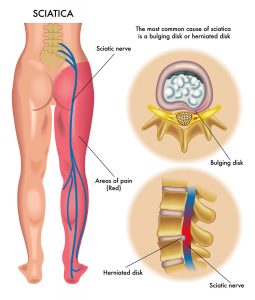Sciatica is a symptom. It appears as a pain in the leg, which may vary in intensity. It can become unbearable, a stabbing pain that makes it almost impossible to stand or sit. It can happen suddenly or it can develop gradually.

Why does sciatica occur?
Sciatica is a very common symptom. It usually affects people between 30 and 50 years old.
The most common cause is having a hernia in a vertebral disc. In elderly people, lumbar stenosis or narrowing of the lumbar canal is the most common cause. There are other conditions that can trigger sciatica. Among them:
– Piriformis syndrome: It develops in the piriformis muscle, a small muscle that is inside the gluteus, which tenses or suffers from spasms that can press the already irritated sciatic nerve.
– Spondylolisthesis: It is the displacement of a vertebra so that it is misaligned with the immediately superior vertebra, narrowing the channel through which the sciatic nerve passes.
Symptoms
You may also feel weakness, numbness, or a burning or tingling sensation that runs down your leg, possibly even on your fingers. Some less common symptoms may include the inability to bend the knee or move the foot and toes.
How is it diagnosed?
A complete medical history, including a detailed explanation of the symptoms, and a physical examination can help the doctor diagnose sciatica and determine its causes.
Your doctor may request other diagnostic imaging tests such as magnetic resonance imaging, x-rays or others to confirm it.
Treatment
The purpose of treatment is to reduce pain and increase mobility. It may include limited rest, physical therapy and the use of medications to treat pain and inflammation. A physical therapy program can also help. In more rebellious cases, a procedure called “blockage” can be performed by injecting medication directly into the affected area to decrease inflammation in the nerve roots. For those patients who do not respond to conservative treatments and have symptoms of progressive disease or who experience very severe pain, spine surgery may be indicated.
You can consult a specialist in orthopaedics since neuropathic pain usually causes great limitation and may require treatment adjustment.
You might also want to read: 5 ways to rapidly relieve sciatica

